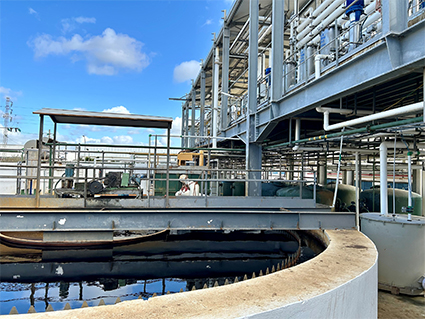From responsible enterprise to regenerative enterprise
21 September 2023
VTL takes an innovative approach, reducing water consumption by 90%.
17 April 2024Anticipating the worst is the best way to avoid it
The +1.5° objective of the Paris Agreement (COP21) has come and gone. By working to adapt France to +4°C global warming by 2100, the French Ministry of Ecological Transition is starting a new phase at the beginning of 2024. But adapting doesn't mean giving up.
As the saying goes, "Adapt to change to last".
This is a minor revolution for those who follow CSR issues and climate negotiations, because to talk about adaptation and drop the +4° is to admit that we no longer believe in the +1.5° objective of the Paris Agreement, and that it would be serious to stop pretending. For the uninitiated, these figures are so abstract that this change of unit slips by like a duck's feathers, but for the more knowledgeable, this signal is still worrying.
2024 marks a turning point in the fight against climate change and launches a new phase. We were clinging to an increasingly implausible climate tension, based on an emissions ceiling that had already been reached. From now on, we need to take a clear-sighted look at the truth that's staring us in the face. Anticipating it and getting organized is our best chance of avoiding it, by preparing for new and likely extremely critical living conditions for humans and their activities.
At the time of the Paris Agreement, scientists were warning decision-makers of the risk of out-of-control climate change if we exceeded 2°. Today, we know that if all signatory countries were to respect their trajectory, we would already be at +2.7° by 2050. But too much inaction, resistance to change and conflicting interests remain. Hence the famous +4°. This level of warming will be accompanied by a cascade of events that we will undeniably have to deal with. For example: heat waves that could last two months or more in the south of France, with extreme heat waves (+45°); the disappearance of French glaciers, with a major impact on biodiversity and water; episodes of intense rainfall in the north of France, with a frequent risk of flooding; water shortages throughout the year; urban heat islands... Entire sectors of our economy are affected and will be forced to adapt. Agriculture first and foremost. Infrastructures, networks, transport, working conditions: everything is going to be turned upside down, and we all need to get involved right away, because it's going to be a bumpy ride!
Aggravation as a gas pedal of mobilization and the emergence of new business models. How many matches have been decided in extremis? How many battles are lost in every war won? To confuse adaptation with resignation is to deny the genius of humanity: its sense of adaptation, precisely. The worldwide mobilization against covid has demonstrated this once again. Companies and their employees can take this genius and invent the world of tomorrow.




